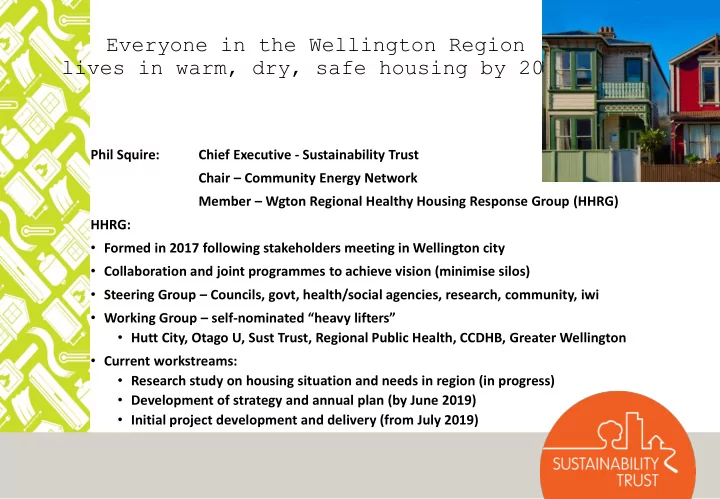

Everyone in the Wellington Region lives in warm, dry, safe housing by 2025 Phil Squire: Chief Executive - Sustainability Trust Chair – Community Energy Network Member – Wgton Regional Healthy Housing Response Group (HHRG) HHRG: • Formed in 2017 following stakeholders meeting in Wellington city • Collaboration and joint programmes to achieve vision (minimise silos) • Steering Group – Councils, govt, health/social agencies, research, community, iwi • Working Group – self- nominated “heavy lifters” • Hutt City, Otago U, Sust Trust, Regional Public Health, CCDHB, Greater Wellington • Current workstreams: • Research study on housing situation and needs in region (in progress) • Development of strategy and annual plan (by June 2019) • Initial project development and delivery (from July 2019)
Housing quality in New Zealand • Low quality housing results in poor health outcomes and higher energy costs • BRANZ House Condition Survey: • 46% of bedrooms unheated • Mould visible in half of houses surveyed • 53% of homes underinsulated in ceiling or underfloor • Half of bathrooms and kitchens with no extractor fans • Rentals generally in poorer condition than owner-occupied • Health Outcomes • 1600 excess winter deaths from respiratory and circulatory – 8000 admissions • Children admitted to hospital for diseases associated with healthy housing twice as likely to be readmitted • Housing sensitive hospitalisation rates strongly correlated with homes in higher deprivation index areas • MOTU study showed up to 6:1 Benefit:Cost for Warm Up NZ insulation/heating programme
Housing Policy and Regulations • Reside sident ntial al Tenanci ncies es Ac Act • All rentals must be insulated by 30 June 2019 (some exceptions) Heal alth thy y Hom omes Guara rant ntee ee Ac Act • • Insulation, heating, ventilation, draughts, moisture/drainage • 1 July 2019 – 30 June 2024 Electricity ctricity Price ice Revie iew • • Cost of and access to electricity services • Renta tal WoF • Wellington city – minimum standards for rentals • Voluntary – Pass/Fail • Partially overtaken by HHGA
Current Healthy Homes Programmes • Well Hom omes es • MoH funded programme targeting children at risk of rheumatic fever and housing-related health conditions. • 800 assessments/year: Porirua/Wellington/Hutt Valley • Regional Public Health, Otago U, Tu Kotahi Maori Asthma Trust, Sust Trust • Warm rmer Kiwi Hom omes • $142M for insulation/heating 2018-2021 • 50,000 low-income homes – CSC/Dep 9-10 eligibility • 67% - 100% for insulation; 67%/max $2000 for heating (TBC by EECA) • Approx 800/year in Wellington region – Electra support for Kapiti • Home ome Energy ergy Savers ers • HES – 500/year detailed home assessments and Action Plans (Wgtn city) • Hom omeFit • National healthy housing standard from NZ Green Building Council • Pass/Fail – advises on upgrades needed to comply
Healthy Housing in Kapiti Regional ional Hea ealth thy Hous using ng Group oup project oject • • Initial project - Target high-needs area (Otaki?) • Consult with Council, local organisations, iwi • HHGA compliance for rentals (regulatory) • HomeFit compliance for owner-occupied (encouragement/financial support?) • Warmer Kiwi Homes subsidy support for insulation/heating (incl. Electra) • Greater Wellington targeted rate ($3600/home for insulation) • Additional financial support needed for other measures • EECA stats for uninsulated homes in Otaki in Dep 9/10: • Rentals – 570 • Owner-occupied – 900 Home ome Energy ergy Savers ers – Ka Kapiti ti • • Bespoke advice on insulation, heating, ventilation, energy use etc. Plus Action Plan • Same assessment protocol as Wgtn City (currently 500/year - $70K funding) • Free to homeowner
Recommend
More recommend